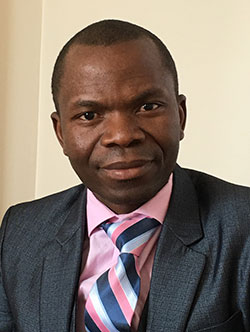Combining roles as a physician, scientist and policymaker in Zambia
March / April 2020 | Volume 19, Number 2

Lloyd Mulenga, MBCHB, MSc, MMED, PhD
Q and A with former Fogarty trainee Lloyd Mulenga, MBCHB, MSc, MMED, PhD
As a physician-scientist-policymaker, Dr. Lloyd Mulenga is an unusual hybrid who leads infectious disease activities at the University of Zambia, in the university’s teaching hospital and lab, as well as within his country’s health ministry. To prepare for these positions, Mulenga earned three advanced degrees with support from
Fogarty research training programs. In addition to conducting research that has resulted in nearly 50 publications, he has also engaged in science diplomacy, delivering a plenary presentation on the state of HIV in Africa at the U.N., and participating in a WHO review of the agency’s HIV treatment guidelines.
How has Fogarty training fostered your career?
First, I did a master’s in infectious diseases, which gave me a great understanding of not just HIV/AIDS but infectious diseases generally. It gave me a broader view of public health and managing disease outbreaks. My next master’s was in internal medicine and was much more clinically focused. That allowed me to progress from data analysis to learning how to design and implement clinical trials. I earned my Ph.D. through the Fogarty-supported
University of Zambia-Vanderbilt Training Partnership for HIV-Nutrition-Metabolic Research. From my time in the U.S., I gained a new perspective on training and that it works best when you learn by doing and actually engaging in research.
Added together, my training has prepared me to be an independent researcher, as well as a policymaker comfortable in collaborating with people from different institutions, such as the WHO, U.N., Global Fund and others. I have reached where I am today because of Fogarty and I’m grateful for all the support.
How do you manage your different roles?
It’s difficult to balance. I spend 40% of my time conducting research, another 40% providing service in the hospital and working in the health ministry, and the other 20% teaching. But the three are interlinked and a lot of synergies exist. Most of the resources come through the ministry so it’s important that I have a voice there. I try to look at problems and see if science can be applied to solve them. And then if a trial or study is approved and funded by the ministry, I take it to the hospital to implement it, and use it to recruit trainees from among my students and mentees. So, my career spans research, training and care - and all three aspects have been encouraged.
How are policymaking and research linked?
Many of the health problems we have require action from policymakers. As researchers, if we don’t engage with decision makers, we won’t be able to solve the problems. Our research provides data that we can use to make the case for policy change. That’s what my training taught me, that I am supposed to advocate for evidence-based interventions or practices. For instance, for one of my master’s theses, I designed a clinical trial to see if a less expensive drug, dolutegravir (DTG), could be used effectively and safely to treat people living with HIV. The results of my successful trial helped lead to the change in the
WHO guidelines, which now recommend DTG as the preferred HIV treatment option.
What do you hope for the future?
My focus is to produce a generation of young scientists who can take on our most pressing health problems through impactful research. Our future depends on young doctors who value research and see it as an important part of their work. I’d like to help build a new crop of physician-scientist-policymakers who become as inspired as I did during my training.
Even though we’ve made progress in improving health in Zambia and have many fewer deaths from HIV/AIDS now, we still have a long way to go. There are still groups we are struggling to reach with testing and care. We need to continue to invest in research, training and service. They must go hand-and-hand together in order for us to succeed.
More Information
To view Adobe PDF files,
download current, free accessible plug-ins from Adobe's website.